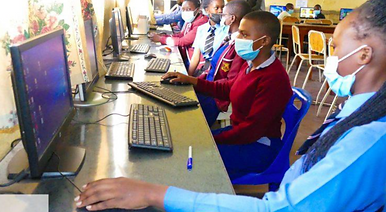Project
Overview
COUNTRY: Zimbabwe
LOCATION: Nationwide, with focus on rural and peri-urban areas
INDUSTRY FOCUS: Renewable Energy, Education Technology
Regain 37 is a Zimbabwean social enterprise established in 2018 that provides integrated solar power and digital learning solutions to off-grid schools. The project aims to improve learning outcomes for primary school pupils through a comprehensive renewable energy solution combined with curated digital learning content, with a particular emphasis on local language resources. The initiative bridges the digital divide in Zimbabwe's educational system by connecting unconnected schools through an innovative rent-to-own business model.

Problem Statement
Zimbabwe faces significant challenges in both energy access and educational technology. With 68% of the population living in rural areas and only one-third of rural households having electricity access, the education sector is severely impacted. Approximately 53% of rural schools are off-grid, with merely 2% having access to solar power. This energy deficit, combined with limited access to digital resources and libraries, has led to a significant urban-rural education gap, with rural students performing notably lower in standardized tests and falling about two years behind their urban counterparts in proficiency standards.
Solution
Regain 37 delivers an integrated solution through a unique pay-as-you-use model at USD1.15 per child per month. The package includes a 5KVa hybrid solar power system, RACHEL server for offline educational content, mini HD projectors, and whiteboards. The solution features an open-architecture content management system providing access to both global educational resources and local content in 16 vernacular languages, making it particularly effective for primary education environments.
Project Stages
Since its founding in 2018, Regain 37 has progressed from initial pilot installations to serving 121 schools and reaching 74,800 pupils. The project has established formal contracts with 410 schools and aims to expand to 480 schools by 2027, potentially reaching over 300,000 pupils. The implementation includes direct sales through provincial/district school authorities, strategic partnerships with faith-based organizations, and planned expansion of regional warehousing facilities.
Impact
The project has demonstrated significant social and educational impact by improving digital access and learning outcomes in rural schools. It supports multiple UN Sustainable Development Goals, including SDG 4 (Quality Education), SDG 7 (Affordable Clean Energy), SDG 8 (Decent Work), and SDG 9 (Industry & Infrastructure). The project has created employment opportunities, enabled community libraries, and facilitated economic activities through power connectivity at schools.
Stakeholders
-
Ministry of Primary and Secondary Education
-
Ministry of ICT and Courier Services
-
Ministry of Health and Child Care
-
Faith-based school networks
-
Technology suppliers (RACHEL and solar equipment providers)
Funding
Total Investment Needed: USD 2.016 million
Funding Allocation:
-
Inventory: 60% (USD 1.21 million)
-
Operating Expenses: 25% (USD 504,000)
-
Capital Expenditure: 15% (USD 302,400)
Previous Funding Secured:
-
Grants: USD 290,000
-
Debt: USD 590,000
Desired Terms:
-
Low-cost foreign currency debt
-
9-12 months grace period
-
48-60 months tenor
-
Interest rate cap at 15%
-
Open to convertible notes and equity investment
.png)



